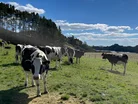Mars Lowers Carbon Emissions for More Sustainable Chocolate

By the end of 2023, Mars has reduced its greenhouse gas emissions by 16% across its value chain since 2015, while growing the business more than 60%.
Mars, a global leader in confectionery, pet food, and food products, has consistently aimed to minimise its environmental footprint.
Recently, the company launched the "Moo’ving Dairy Forward" initiative, a commitment to reducing the carbon footprint of its dairy supply chain as part of Mars’s net zero by 2050 ambition.
This initiative is part of Mars's broader strategy to cut carbon emissions across its value chain by a further 50% by 2030, backed by a US$1bn investment.
By partnering with major dairy companies, Mars is taking significant steps to address climate change and promote sustainable agriculture.
Mars’s collaborations driving climate action
Mars has also partnered with FrieslandCampina, a Dutch dairy cooperative, to implement the Sustainable Dairy Development Program.
This collaboration focuses on improving feed ingredients and introducing new feed components that reduce methane emissions from cows.
Additionally, Mars is working with Germany's DMK Group on a five-year project to establish pilot "net zero" dairy farms.
These farms aim to create scalable, economically viable pathways to achieving net-zero emissions in dairy production.
Furthermore, Mars has teamed up with Fonterra, a New Zealand-based dairy cooperative, and Sea Forest to explore the SEAFEED seaweed food supplement trial.
This innovative supplement reduces methane emissions from cows' digestion, contributing to a more sustainable dairy supply chain.
In Poland, Mars is launching one of the largest Bovaer feed additive projects which aims to reduce methane emissions from cattle by 30% through innovative feed additives.
This project is in collaboration with Interfood, a dairy trading company and Mlekovita, Poland's largest dairy cooperative, targeting methane reduction in dairy farming.
Mars’s innovative approaches to emissions reduction
Mars's commitment to reducing its carbon footprint extends beyond dairy.
The company is reformulating products and prioritising suppliers that embrace sustainable practices.
By adding "carbon intensity" as a criterion, Mars encourages farms to reduce their climate impact.
This approach may lead to changes in suppliers or geographic shifts in sourcing, aligning with Mars's roadmap to net-zero emissions.
The company's efforts are part of a broader strategy to address agriculture's energy use and convert it to renewable sources.
Mars is also working to make its cocoa supply chains deforestation-free by 2025, recognising this as a significant step towards its climate goals.
Mark Moffitt, Mars’s Sustainable Sourcing Manager for Dairy in the Mars snacking business says: “Dairy is our second largest contributor to the Mars carbon footprint, so climate action is central to our dairy sourcing strategy.
“My role focuses on engaging our suppliers around the world on their carbon reduction plans and developing climate programs in partnership with them to implement on-farm practices that can reduce emissions.”
He continues: “Mars is keen to be early movers in this space. We’re really curious about what innovative technology and solutions exist out there.
“For example, we have a project in Europe where we're using a cow feed additive that can reduce methane emissions from cow burps by 30%. We're also exploring other solutions like a seaweed feed additive and its impact on methane emissions.”
Mark concludes: “Some of the solutions we're seeing have the potential for significant impact, like new technologies in manure management that could reduce the carbon emissions from manure by up to 90%.
“While there's no silver bullet, these high-impact interventions are pretty exciting.”
--------------
Make sure you check out the latest news at Food Digital, a BizClik brand.




